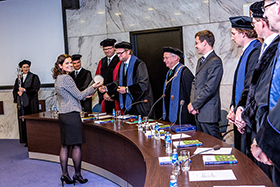PhD Defence: Purchasing and Supply Management at the Purchase Category Level
 Over the past two decades, purchasing has evolved from a clerical function focused on minimum price into a strategic function focused on value creation and achieving competitive advantage. Purchase category managers are under increasing pressure to find ways to cut costs and yet get more innovative products and services from their suppliers. New research by PhD candidate Melek Akin Ates reveals one factor essential for improving costs and innovation performance is the alignment between purchasing strategy and purchasing structure. Ates’ PhD dissertation ‘Purchasing and supply management at the purchase category level: Strategy, structure, and performance’, describes how a misfit between strategy and structure negatively affects the quality of purchasing processes, which is deleterious to cost and innovation performance.
Over the past two decades, purchasing has evolved from a clerical function focused on minimum price into a strategic function focused on value creation and achieving competitive advantage. Purchase category managers are under increasing pressure to find ways to cut costs and yet get more innovative products and services from their suppliers. New research by PhD candidate Melek Akin Ates reveals one factor essential for improving costs and innovation performance is the alignment between purchasing strategy and purchasing structure. Ates’ PhD dissertation ‘Purchasing and supply management at the purchase category level: Strategy, structure, and performance’, describes how a misfit between strategy and structure negatively affects the quality of purchasing processes, which is deleterious to cost and innovation performance.
Managing purchasing and supply departments has a substantial impact on a firm’s performance and competitiveness, and its role in contributing to competitive advantage is increasingly acknowledged. Goods and services – ranging from raw materials to office supplies, components and spare parts –necessitate different strategies for each category. Yet, little is known about what firms should do to successfully manage this variety. Ates’ research shows that one of the crucial elements relates to the organisational design of purchasing; having a structure that is aligned with purchasing strategy, not only at the organisational level but also at the purchase category level.
 Ates’ research shows that if the key objective in a purchase category is to cut costs, firms should manage it centrally and formally, while providing support via a less cross-functional structure. On the other hand, if innovation is the key objective, then a decentralised, less formal and cross-functional purchasing structure should be adopted. Misfits cause both costs and innovation to suffer.
Ates’ research shows that if the key objective in a purchase category is to cut costs, firms should manage it centrally and formally, while providing support via a less cross-functional structure. On the other hand, if innovation is the key objective, then a decentralised, less formal and cross-functional purchasing structure should be adopted. Misfits cause both costs and innovation to suffer.
Ates’ findings encourage purchase managers to be even more cautious about misfits in purchase categories managed for innovation, because results suggest that detrimental effects are not only experienced in internal processes, but can extend beyond the boundaries of the firm to affect supplier behaviour too. Purchasing managers faced with unsatisfactory performance outcomes should avoid the one-sided view that suggests the purchasing processes might be creating this negative outcome. The cause of lower performance could be related to problems in the design of the organisation rather than in the implementation of the wrong purchasing processes.
Ates defended her dissertation at Erasmus University Rotterdam on Friday 10 January, 2014. Her supervisor was <link people finn-wynstra>professor Finn Wynstra and her co-supervisor was <link people erik-van-raaij>Dr. Erik van Raaij. Other members of the Doctoral Committee were <link people jan-van-den-ende>professor Jan van den Ende (Erasmus University Rotterdam), professor Frank Rozemeijer (Maastricht University), and <link people justin-jansen>professor Justin Jansen (Erasmus University).
About Melek Akin Ates
 Melek Akin-Ates (Turkey, 1985) holds a double bachelor’s degree in Business Administration and International Trade and Finance from Izmir University of Economics, Turkey, where she graduated as the valedictorian in 2007. She was awarded the Huygens Scholarship from the Dutch Ministry of Education, Culture and Science which allowed her to start her MSc in Supply Chain Management at RSM. After graduating cum laude in October 2008 she joined the Department of Management of Technology and Innovation at RSM to pursue a PhD. Her main research interests include purchasing strategies, buyer-supplier relationships, purchasing and innovation, and green supply chain management. She has presented her research at several international conferences including Academy of Management (2012), EurOMA (2010), and Decision Sciences (2011, 2012). One of her articles has been published in the International Journal of Production Research in 2012, and others are currently under review in operations and supply management journals where she also frequently serves as an ad-hoc reviewer. In addition to her research, she has also supervised many bachelor and master thesis projects, and has lectured for the Strategic Sourcing elective course. Melek is currently an Assistant Professor in the Department of Technology & Operations Management at Erasmus University Rotterdam.
Melek Akin-Ates (Turkey, 1985) holds a double bachelor’s degree in Business Administration and International Trade and Finance from Izmir University of Economics, Turkey, where she graduated as the valedictorian in 2007. She was awarded the Huygens Scholarship from the Dutch Ministry of Education, Culture and Science which allowed her to start her MSc in Supply Chain Management at RSM. After graduating cum laude in October 2008 she joined the Department of Management of Technology and Innovation at RSM to pursue a PhD. Her main research interests include purchasing strategies, buyer-supplier relationships, purchasing and innovation, and green supply chain management. She has presented her research at several international conferences including Academy of Management (2012), EurOMA (2010), and Decision Sciences (2011, 2012). One of her articles has been published in the International Journal of Production Research in 2012, and others are currently under review in operations and supply management journals where she also frequently serves as an ad-hoc reviewer. In addition to her research, she has also supervised many bachelor and master thesis projects, and has lectured for the Strategic Sourcing elective course. Melek is currently an Assistant Professor in the Department of Technology & Operations Management at Erasmus University Rotterdam.
Abstract of Purchasing and Supply Management at the Purchase Category Level: Strategy, Structure, and Performance
Over the past two decades, purchasing has evolved from a clerical function focused on buying goods and services at a minimum price into a strategic function focused on value creation and achieving competitive advantage. This dissertation examines how firms can effectively manage their various purchase categories in order to have a high purchasing performance. Building on the strategy-structure-performance paradigm of contingency theory, I specifically focus on the link between purchase category strategies, purchasing and supply base structures, and purchase category performance.
Analysing data from an international purchasing survey project, I identify five purchase category strategies based on the competitive priorities emphasized: Emphasize All, Cost Management, Product Innovation, Delivery Reliability, and Emphasize Nothing. The findings demonstrate that some strategies are more likely to be implemented under certain conditions, but that it is possible to implement multiple purchase category strategies in an effective way under the same conditions. After identifying these strategies, using the same data set I examine the link between purchase category strategies and purchasing structure. The results suggest that the strategy-structure misfit has a negative impact on the quality of how purchasing processes are executed, which in turn decreases cost and innovation performance. Finally, I investigate the link between purchase category strategies and supply base structure, an external structure affected by strategy. Using the multiple case study method, I develop propositions to be tested in future studies. Consequently, this dissertation extends knowledge on purchasing and supply management by generating theoretical and managerial insights regarding how to successfully manage purchase categories.
Photos: Chris Gorzeman / Capital Images

